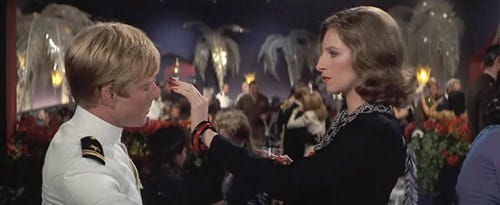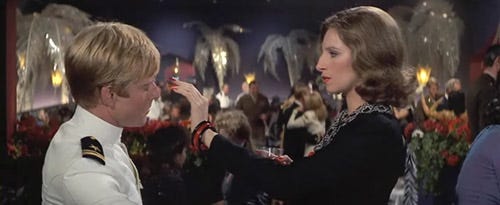Revisiting The Way We Were (and Feeling Especially Jewish)
To share the “books and people who have saved me” was the initial undertaking of this Substack. But growing up in a family of movie watchers—and movie critics—means many of my formative experiences have come from watching films, good and bad.
Last night we watched The Way We Were (1973) to commemorate its fiftieth anniversary and my dad’s friend (and my nerd hero) Garrett Stewart, the most philosophical of Streisand’s interpreters and the author of the recent book Streisand: The Mirror of Difference (2023), and the star’s own new memoir, My Name is Barbra.
We watch a lot of our movies on DVDs. (We’re totally prepared for the streaming platforms to collapse.) Something I like to do is read the summary on the back to see if it does the film justice. Whoever wrote the synopsis of The Way We Were clearly only watched the first ten minutes of the film. According to Columbia Pictures, Hubbell and Katie are “star-crossed lovers.”
They are not thwarted by a malign star! There is no external source of doom in their relationship! It is Hubbell’s own moral failing that precipitates the tragic ending, if we can even call it that.
Star-crossed means doomed. But it has come to mean (in contemporary, un-Shakespearian parlance) that two people are meant for each other. In this further sense they are also not star-crossed. Katie goes out of her way to get Hubbell—she uses all her ration stamps to buy steaks for him! He’s always trying to leave. He’s constantly at the door holding his hat. And when he’s inside, he’s holding a drink. He tries to break up with her several times.
But the problem isn’t Katie. She’s charming, loving, and brings out the best in Hubbell. (After he wises up, the silliest character in the film, Hubbell’s wealthy friend J.J., offers the truest assessment of Katie when comparing her to his own wife, Carole-Ann, whose departure “is not a real loss—it’s not like losing Katie.”)
Hubbell chooses to be asleep, to have it easy. As we learn from a flashback to their college days, Hubbell feels things “come too easy” to him—sports, girlfriends, friends, writing, safe wartime assignments, and later, well-paid Hollywood gigs. Yet it is Hubbell’s (well-masked) self-loathing and fear that’s led him to sleepwalk through life. (He is literally asleep at the beginning of the film. Or at least in a drunken stupor.)
Hubbell is profoundly oblivious. He’s married to a Jewish woman, and yet when asked what the best year was, he says searchingly “1944 . . . 45.” He is so trapped in his own nostalgia (for his naval uniform, for simpler times) that he cannot see the barbarity of his answer. His answer not only reflects Hollywood’s sanitized approach to that era of history, but Hubbell’s own preference for the palatable, his resistance to hearing the truth about himself and his work, and his inclination toward people who treat him like a god.
When we finished watching it, my mom said, “You know, it’s not as sad as I remember it.” And I said, “It’s a lot more sad than I remember it.” Of course, in my relationship with my mother, mom’s the Katie and I’m the Hubbell. (I.e. she’s just trying to bring out the best in me, and that can be uncomfortable.) The movie works out great for Katie! She escapes self-pitying Hubbell and has a nice Jewish husband. And what does he have? A mute, blond, shiksa wife who soothes and supports him.
This film asks a lot of the viewer. It asks you to see how even someone who looks perfect and perfectly put together might actually be suffering; to see that a partner who might seem “demanding” is really committed to helping you be the best version of yourself. It asks, do you want to sleepwalk through your life, being motivated by fear and surrounding yourself with people and lovers who will simply soothe your ego? Or do you want to know and understand the worst of yourself (and the world) and try to make them better?




